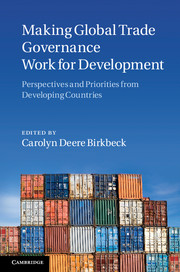 Making Global Trade Governance Work for Development
Making Global Trade Governance Work for Development Book contents
- Frontmatter
- Contents
- Figures
- Tables and boxes
- Contributors
- Acknowledgements
- Introduction
- Part I Global trade governance
- Part II Roles and responsibilities in global trade governance: diversity in developing country priorities and strategies
- Part III Strengthening multilateralism
- 10 The WTO, democracy and development: a view from the South
- 11 Reclaiming development in the world trading system (revisited): proposals for reform of WTO governance
- 12 Fostering developing country engagement in the WTO dispute settlement system
- 13 Rethinking the governance of Aid for Trade
- 14 Strengthening WTO surveillance
- 15 Why not an ombudsperson at the WTO? A proposal for debate
- Part IV Making WTO negotiations and decision-making processes fairer
- Part V Conclusion
- Index
- References
14 - Strengthening WTO surveillance
making transparency work for developing countries
from Part III - Strengthening multilateralism
Published online by Cambridge University Press: 07 September 2011
- Frontmatter
- Contents
- Figures
- Tables and boxes
- Contributors
- Acknowledgements
- Introduction
- Part I Global trade governance
- Part II Roles and responsibilities in global trade governance: diversity in developing country priorities and strategies
- Part III Strengthening multilateralism
- 10 The WTO, democracy and development: a view from the South
- 11 Reclaiming development in the world trading system (revisited): proposals for reform of WTO governance
- 12 Fostering developing country engagement in the WTO dispute settlement system
- 13 Rethinking the governance of Aid for Trade
- 14 Strengthening WTO surveillance
- 15 Why not an ombudsperson at the WTO? A proposal for debate
- Part IV Making WTO negotiations and decision-making processes fairer
- Part V Conclusion
- Index
- References
Summary
Trade governance is moving higher on the World Trade Organization (WTO) agenda – and monitoring and transparency are integral parts of it. On 15 October 2009, eighteen WTO Members (including the largest trading powers) submitted a brief text calling for a ‘deliberative process to review the organization’s functioning, efficiency and transparency and consider possible improvements’ (WTO 2009b, emphasis added). A month later Pascal Lamy, the Director-General, explained that the Geneva Ministerial meeting (30 November to 2 December 2009) would offer ‘a platform for ministers to review the functioning of this house’ (Lamy 2009). At the conclusion of the meeting, the Chair noted that Members believed that WTO monitoring had helped to ‘stave off protectionist responses to the [economic] crisis’ but notifications, data collection, analysis, and dissemination needed further improvement (WTO 2009a). As the Doha Round of trade negotiations stumbles on, WTO Members and the Secretariat are taking increasing interest in the governance and effectiveness of the multilateral trade regime (Deere 2009; Deere Birkbeck and Cherneva 2010). Against this background, this chapter examines WTO monitoring to ask how it has responded to calls for improved transparency and whether it meets developing countries’ information needs in the trade regime.
- Type
- Chapter
- Information
- Making Global Trade Governance Work for DevelopmentPerspectives and Priorities from Developing Countries, pp. 394 - 441Publisher: Cambridge University PressPrint publication year: 2011
References
- 4
- Cited by


